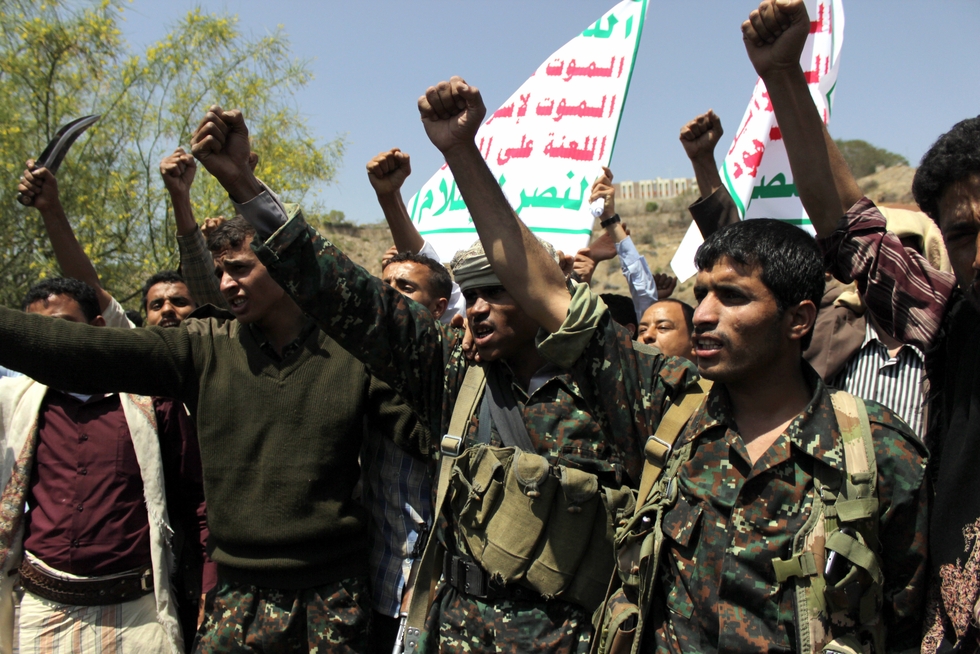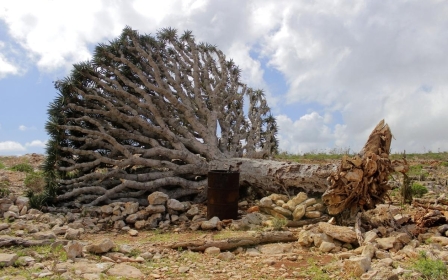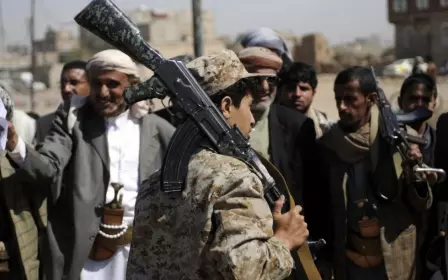Locals in Yemen’s Taiz accuse Houthis of extortion

TAIZ, Yemen - In the flashpoint city of Taiz in south-west Yemen Houthi rebels are extorting money from suspected civilian supporters of exiled President Abd Rabbuh Mansour Hadi, locals have told Middle East Eye.
Taiz residents have suffered months of fighting in the now ruined city, between the Houthis and forces loyal to President Hadi.
The Saudi-led coalition, which is seeking to push back the advancing Houthis, recently airdropped weapons for pro-Hadi fighters in the city, which lies along a strategic route linking north Yemen to the key southern port city of Aden.
The Houthis have set up checkpoints in areas under their control in Taiz, and use them to stop civilians and check for any signs of support for the pro-Hadi forces, locals told Middle East Eye.
Solaiman al-Maqtari, 29, was driving his taxi at the Sofitel roundabout in the Hawban area on 22 October at around 8am when the Houthis stopped him for inspection.
The militiamen from north Yemen found 60 litres of fuel stored in bottles inside the car – this raised suspicion as fuel is in scarce supply in Taiz.
The Houthis then seized Maqtari’s mobile phone and started to check it for signs of pro-Hadi support.
“They accused me of smuggling fuel to the fighters of the resistance (pro-Hadi forces),” Maqtari said. “Then they found a photo of the leader of the resistance in Taiz, Hamoud al-Mikhlafi, and for this reason they accused me of being a resistance supporter.”
Maqtari says he tried to explain to the Houthis that he was not a supporter of the pro-Hadi forces, and that the photo of Mikhlafi had automatically downloaded to his phone from the application WhatsApp.
“But the Houthis insisted that I am a supporter of the resistance and parked my car near their checkpoint. They took me inside their workshop nearby and asked me to wait there. They returned less than an hour later, with another person they had stopped at the checkpoint,” he said.
By midday Maqtari said there were three other people being held in the workshop – all of them local taxi drivers.
Five Houthi fighters later arrived in a military vehicle and took all the people held in the workshop to al-Saleh city, some 10 kilometres away.
Maqtari said on arrival to Saleh city the Houthis took him to a large makeshift prison, which was made up of four separated departments – one area for pro-Hadi fighters, a second for high-ranking detainees, a third for activists, and a further for civilian supporters of the troops.
“One of the Houthis told me our issue was simple,” Maqtari said. “He said we would be taken to the department for supporters [of the pro-Hadi forces] and that those detainees usually can leave the prison easily.”
“When I entered the department for the supporters it was almost full as they each person in a room on their own – there was hardly any room for me. They refused to return my mobile phone or tell me what was going to happen – they just said I was a supporter [of Hadi] and that they had evidence for this.”
Held for ransom
Maqtari was held in this prison for seven days, during which time his Houthi prison guards gave him bread and water. He was barred from contacting his family until, after a week, one of the Houthi guards told him to contact one of his relatives to come for a chat.
“I contacted my cousin in Taiz, Yaseen, and he came the next day,” Maqtari said. “I realised quickly that I was not being accused of anything and instead the Houthis were looking for money to free me.”
“Two days later I gave them YR300,000 ($1,400) and they immediately released me and gave me back my taxi. But they didn’t give me my mobile phone,” he added.
Since being released at the beginning of November Maqtari hasn’t returned to Taiz city, fearing detention by the Houthis, and has instead stayed in his nearby village of al-Maqatirah.
The Houthis argue that they are fighting al-Qaeda in the Arabian Peninsula (AQAP), as well as the emergent Yemeni branch of the Islamic State (IS) group, and that this means it is necessary to regularly stop and detain people for investigation.
“I challenge anyone to say the Houthis have tortured them in prison because they are a supporter [of the pro-Hadi forces],” Zuhair Ali, a Houthi supporter in Taiz, told Middle East Eye. “We do not torture the detainees even if they are members of the resistance.”
Ali denied that the Houthis are extorting money from people in their detention.
“If there is a member of Ansarallah (the Houthis) who took money in order to free a detainee that is a shame on the man himself and not a mistake of the group. Mistakes happen everywhere in the world,” he said.
It is not known how many people are being held at the Houthi prison outside Taiz, however, the head of a local rights organisation said there are dozens of detainees.
“We do not have exact figures for the number of detainees but almost every day we meet detainees leaving the city and most of them said that they paid money for the Houthis to release them,” said Tawfeeq al-Shoaibi, a lawyer and director the National Organisation for Defending Rights and Freedom.
Shoaibi said that the Houthis are extorting money from detainees to sustain their military operations, as the rebels do not have a source of income in Taiz.
“The Houthis did not come to Taiz according to the law and they do not understand anything but the war,” he added.
New MEE newsletter: Jerusalem Dispatch
Sign up to get the latest insights and analysis on Israel-Palestine, alongside Turkey Unpacked and other MEE newsletters
Middle East Eye delivers independent and unrivalled coverage and analysis of the Middle East, North Africa and beyond. To learn more about republishing this content and the associated fees, please fill out this form. More about MEE can be found here.




